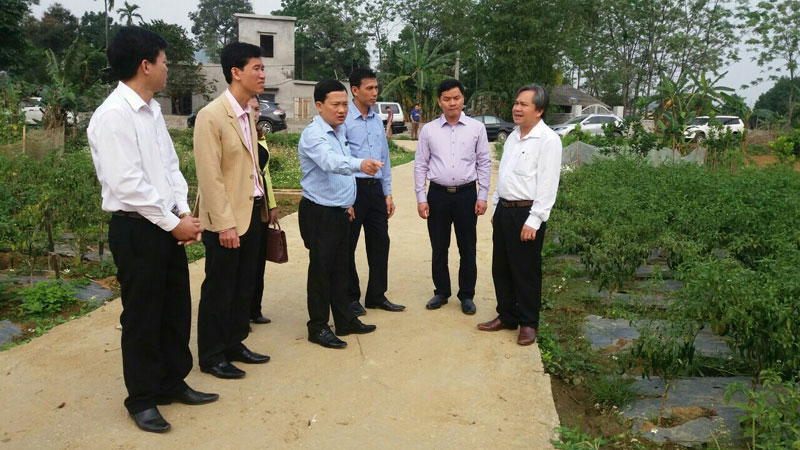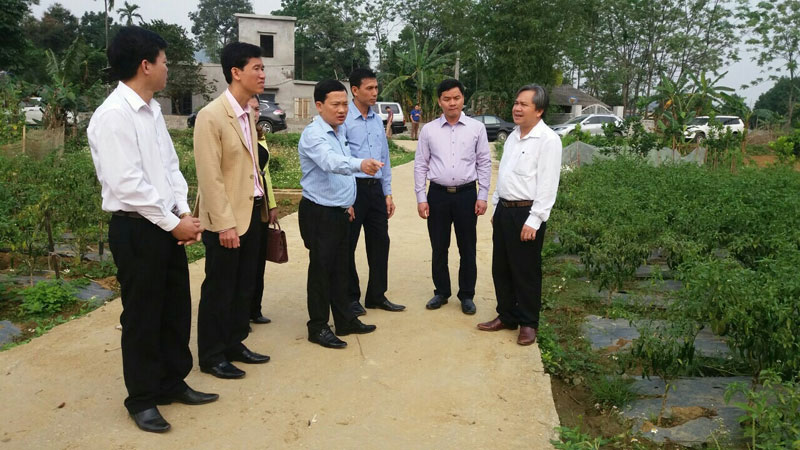
(HBO) - Kim Boi district has identified agriculture as the pillar and spearhead in socio-economic development over the past years. Therefore, the district’s Party Committee and People’s Committee have led efforts to optimize local potential and strength, gearing towards commercial agricultural production with high economic values.
The
district has established citrus growing zones in Tu Son, Du Sang, Vinh Tien,
Bac Son, Hung Tien, Kim Son, Nam Thuong and My Hoa communes. In 2018, the total
citrus area was nearly 1,300 hectares, with total output reaching 7,800 tonnes
and each ha generating from 200-250 million VND.
Of
the total area, 149 ha of citrus gardens in Tu Son, Du Sang, Vinh Tien and Binh
Son communes have received food safety and VietGap certificates. Besides, 34 ha
of longan in Son Thuy and 3.2 ha of citrus in Vinh Tien commune were certified
as organic cultivation, helping local fruit find markets in Hanoi and some other provinces, and improve
added value in production.
 Dinh Van Duc, Vice
Chairman of the provincial People’s Committee, visits a chili growing model in
Thuong Bi commune
Dinh Van Duc, Vice
Chairman of the provincial People’s Committee, visits a chili growing model in
Thuong Bi commune
To
facilitate the sustainable development of agriculture and make the best use of
local advantages, Kim Boi has took the initiative in building production chains
and linkages between businesses and cooperatives for product marketing.
The
district has developed a 149-ha citrus growing chain at Muong Dong Cooperative;
and partnered with Tan Loc Phat Company to build a cultivation chain of pumpkin
seeds on over 86 ha and cucumber seeds on 7.3 ha; with Nhiet Doi (Tropical)
Company and Hai Mui Ten Do Ltd., Co. to grow 33 ha of bitter melon and 3.2 ha
of gourd for seeds; and with Dong Giao Foodstuff Export JSC in Ninh Binh
province to grow 154 ha of sweet corn, among others.
Besides,
the district has formed 15 farms and 22 cooperatives, of which 11 cooperatives have
established partnership with businesses. Of note, five cooperatives and farms have
successfully built their own brand names and received food safety certificates,
namely the Muong Dong agriculture and trade cooperative, the Son Thuy
agricultural service cooperative, the Hop Kim husbandry and service cooperative,
Linh Dung farm and Ha Bi cooperative./.
According to data from the Hoa Binh Provincial Party Committee, the industrial production index for the first six months of 2025 is estimated to have increased by 20% compared to the same period last year. This marks the highest year-on-year growth rate for this period since 2020.
In the first six months of 2025, Hoa Binh province’s export turnover was estimated at 1.145 billion USD, marking an 18.11% increase compared to the same period in 2024. Import turnover was estimated at $ 804 million, a 17.15% increase, which helped the province maintain a positive trade balance.
The lives of the ethnic minority farmers in Tan Lac district have gradually improved thanks to the new directions in agricultural production. This is a testament to the collective strength fostered through the professional associations and groups implemented by various levels of the district’s Farmers’ Union.
With the motto the "product quality comes first,” after nearly one year of establishment and operation, Muong village’s Clean Food Agricultural and Commercial Cooperative, located in Cau Hamlet, Hung Son Commune (Kim Boi district), has launched reputable, high-quality agricultural products to the market that are well-received by consumers. The products such as Muong village’s pork sausage, salt-cured chicken, and salt-cured pork hocks have gradually carved out a place in the market and they are on the path to obtaining the OCOP certification.
In the past, the phrase "bumper harvest, rock-bottom prices" was a familiar refrain for Vietnamese farmers engaged in fragmented, small-scale agriculture. But today, a new spirit is emerging across rural areas of Hoa Binh province - one of collaboration, organisation, and collective economic models that provide a stable foundation for production.
Maintaining growing area codes and packing facility codes in accordance with regulations is a mandatory requirement for agricultural products to be eligible for export. Recently, the Department of Agriculture and Environment of Hoa Binh province has intensified technical supervision of designated farming areas and packing facilities to safeguard the "green passport" that enables its products to access international markets.



 Dinh Van Duc, Vice
Chairman of the provincial People’s Committee, visits a chili growing model in
Thuong Bi commune
Dinh Van Duc, Vice
Chairman of the provincial People’s Committee, visits a chili growing model in
Thuong Bi commune